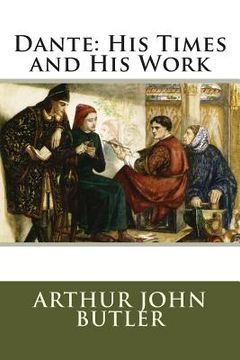Reseña del libro "Dante: His Times and His Work (en Inglés)"
Dante: His Times and His Work is a classic biography of the great Italian poet, Dante by Arthur John Butler that contains the following chapters: The thirteenth century -- Guelfs and Ghibelines -- Dante's early days -- Florentine affairs till Dante's exile -- Dante's exile -- The "Commedia" -- The minor works -- Appendix I. Some hints to beginners -- Appendix II. Dante's use of classical literature. I have made some attempt to deal in a concise way with two subjects which have not, I think, hitherto been handled in English books on Dante, other than translations. One of these is the development of the Guelf and Ghibeline struggle from a rivalry between two German houses to a partisan warfare which rent Italy for generations. Dante Alighieri, simply called Dante (c. 1265 - 1321), was a major Italian poet of the Late Middle Ages/Early Renaissance. His Divine Comedy, originally called Comedìa (modern Italian: Commedia) and later christened Divina by Boccaccio, is widely considered the most important poem of the Middle Ages and the greatest literary work in the Italian language. In the late Middle Ages, most poetry was written in Latin, accessible only to the most educated readers. In De vulgari eloquentia (On Eloquence in the Vernacular), however, Dante defended use of the vernacular in literature. He would even write in the Tuscan dialect for works such as The New Life (1295) and the Divine Comedy; this highly unorthodox choice set a precedent that important later Italian writers such as Petrarch and Boccaccio would follow. Dante was instrumental in establishing the literature of Italy, and his depictions of Hell, Purgatory, and Heaven provided inspiration for the larger body of Western art.[3][4] He is cited as an influence on John Milton, Geoffrey Chaucer and Alfred Tennyson, among many others. In addition, the first use of the interlocking three-line rhyme scheme, or the terza rima, is attributed to him. In Italy, he is often referred to as il Sommo Poeta ("the Supreme Poet") and il Poeta; he, Petrarch, and Boccaccio are also called "the three fountains" or "the three crowns". Dante was born in Florence, Republic of Florence, present-day Italy. The exact date of his birth is unknown, although it is generally believed to be around 1265. This can be deduced from autobiographic allusions in the Divine Comedy. Its first section, the Inferno, begins, "Nel mezzo del cammin di nostra vita" ("Midway upon the journey of our life"), implying that Dante was around 35 years old, since the average lifespan according to the Bible (Psalm 89:10, Vulgate) is 70 years; and since his imaginary travel to the nether world took place in 1300, he was most probably born around 1265. Some verses of the Paradiso section of the Divine Comedy also provide a possible clue that he was born under the sign of Gemini: "As I revolved with the eternal twins, I saw revealed, from hills to river outlets, the threshing-floor that makes us so ferocious" (XXII 151-154). In 1265, the sun was in Gemini between approximately May 11 and June 11 (Julian calendar).[5] Giovanni Boccaccio described Dante's appearance and demeanor as follows: "the poet was of middle height, and in his later years he walked somewhat bent over, with a grave and gentle gait. He was clad always in most seemly attire, such as befitted his ripe years. His face was long, his nose aquiline, and his eyes big rather than small. His jaws were large, and his lower lip protruded. He had a brown complexion, his hair and beard were thick, black, and curly, and his countenance was always melancholy and thoughtful."[6] Dante claimed that his family descended from the ancient Romans (Inferno, XV, 76), but the earliest relative he could mention by name was Cacciaguida degli Elisei, born no earlier than about 1100. Dante's father, Alaghiero[7] or Alighiero di Bellincione, was a White Guelph who suffered no reprisals after the Ghibellines won the Battle of Montaperti in the middle of the 13th c

